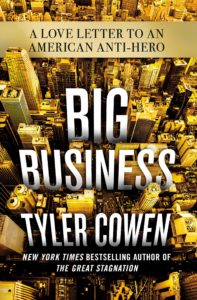The Virtues of Big Business in America
By Arnold Kling


- I have a complaint about America today, and it is simple: we don’t love business enough.
- —Tyler Cowen, Big Business: A Love Letter to an American Anti-Hero,1 page 6
Tyler Cowen’s book, Big Business, is subtitled A Love Letter to an American Anti-Hero, but it could be described as a complaint letter directed at the journalists, politicians, academics, and ordinary citizens who demonize American corporations. Cowen refutes the accusations made by these kibitzers and critics.
Although the material in the book makes it suitable for a reading list for a course on business ethics or the philosophy of capitalism, Cowen is writing for a general audience. The tone of the book is conversational and personal. He uses the word “I” frequently, taking clear ownership of the opinions expressed in Big Business.
In the opening chapter, Cowen reminds us that we owe our quality of life to the accomplishments of businesses. Moreover, he asserts, American business outperforms business in the rest of the world at achieving high standards of quality, innovation, and productivity. As with all assertions throughout the book, Cowen cites economic studies that buttress his claims.
Each of the subsequent chapters poses a rhetorical question. Chapters two through eight address complaints that are commonly made about big business, such as “Are CEOs paid too much?” or “What is Wall Street good for, anyway?” or “How much does big business control American government?” In the final chapter, Cowen speculates about the psychology behind our resentment of big business.
The book is leavened with quirky observations concerning the human condition. For example, Cowen suggests that when it comes to fraud and deception, businesses are less ruthless than ordinary individuals.
- Personally, I would be hard-pressed to find a big business that lies to me as much as—presumably—my friends, family, and closest associates do. (You can ask them about me.) Of course, I have to get along with those associates on a very regular basis, whereas big business remains at a distance, emotionally, physically, or otherwise. So I tend to mentally blur over the fact that my closest associates lie to me so that I may continue to cooperate with them and to enjoy those interactions… In contrast, it is easy enough to curse Shell but every now and then pull into one of their stations… in their commercial interactions with consumers, they try to be very honest and straightforward, even if some of their lobbying is more problematic. (page 26)
Big Business is not an advice book for policy makers. There are chapters on the technology industry and on the finance industry, but Cowen does not attempt to suggest a regulatory framework for these sectors. Instead, he hopes to tweak our perceptions and attitudes.
For example, on technology and privacy, Cowen writes:
- … gossip is an age-old problem, and even today a lot of the biggest privacy harms come through very traditional channels… In the workplace, one employee may tell the boss that another does not work hard enough, shows up late, drinks too much, is fooling around sexually with someone else in the office, and so on. Again, it is at least possible that these kinds of privacy violations and/or lies are worse than what happens over social media and the internet. (page 131)
On finance, he writes:
- In the 1920s, it was commonly believed that American banks were too big, and so regulations were passed limiting their size, most of all by restricting interstate banking… When the Great Depression started, however, a large number of these small banks failed, as they were insufficiently diversified and had a hard time raising capital or otherwise protecting against sudden losses. In Canada there also was a severe depression, but the banking sector was much more concentrated, and so Canada did not see any bank failures at all. (page 165)
Much of Big Business musters arguments and evidence against the accusations critics articulate concerning the corporate sector. But to me, this is an exercise in Whack-a-Mole, where every time you knock down one canard against big business another one will pop up.
In the last chapter, Cowen seeks to surface and address the basic gut-level resentment that people feel toward corporations as employers, sellers, and political actors. I believe that for the Whack-a-Mole efforts to pay off, this chapter must succeed.
At this point, Cowen steps back and addresses the role of corporations in modern society as well as how our human nature shapes our emotions about them. Although he spells out his thoughts on the economic role of corporations in an appendix, I found that his most useful observations appeared in the chapter on fraud and deception.
- There is growing evidence that corporate culture is a major driver of corporate success (or failure). By corporate culture I mean the values, norms, and formal and informal institutions embedded in individual firms, including those related to trust and trustworthiness. It can be said that corporate culture is what employees do when no one is watching. This includes what kind of behavior workers expect from others, how they frame their work tasks, and what workers view as the true mission of the organization. When I talk to CEOs or company founders, I am struck by how often they cite corporate culture as the ultimate source of competitive advantage or persistent profits…
- Responses from a survey of senior executives… reaffirm the importance of corporate culture. More than half of the executives surveyed cited corporate culture as one of the top three drivers of firm value, and of that sample 92 percent expressed the view that a better corporate culture would make their companies more valuable… More than half of these executives claimed they would walk away from a proposed acquisition if the corporate culture of the company to be acquired was not a good match. (pages 32-33, emphasis in original)
This resonates with my own view. A large, established enterprise can be thought of as a cultural institution, with particular rules, norms, systems, processes, and institutional knowledge ingrained throughout the firm. In a stable environment, this corporate culture is a valuable asset. But as the business environment evolves, a firm’s culture can inhibit its ability to adapt. Cultural assets can depreciate, and one of the most difficult tasks for top management is to know when and how to replace elements of a culture that otherwise had served to keep the enterprise sturdy and reliable.
On the question of why big business is disliked, Cowen points out that we tend to attribute human-like qualities to corporations. This fits in with our natural tendency to try to explain major events by attributing human or human-like agency.
- As observers, we are built to anthropomorphize as a natural reaction to change or to the unexplained or to possible menace. We find comfort in the language of conscious planning and intent, and that is one reason people have trouble grasping the operation of a relatively impersonal market order of the sort that characterizes the modern world. (page 188)
As consumers, when we are happy with our purchases from corporations, we assume that it is because they like us. Our instinct is to think of them as our friends. Cowen notes that corporations encourage such feelings. But the flip side is that when we are disappointed with our purchases, we react with personal animosity.
Moreover, as employees we want to be treated paternalistically. Cowen writes that,
- … we have expected companies to provide our health insurance, our disability insurance, parental leave, counselors for mental health issues, and sometimes daycare for our children. And that’s on top of the salaries, offices, internet connections, and friendships they supply us with.
- The British economist and journalist Tim Harford has raised the possibility that perhaps corporations never can live up to all of those expectations and we ought to give companies a narrower mission and judge them accordingly. Whatever social services and benefits need to be provided, perhaps those ought to be conveyed explicitly through the government or through individual markets. (page 198)
I would add that a common misconception is that health care benefits, for example, come from the firm’s generosity, when economic reasoning would predict that, at least on average, such benefits are subtracted from take-home pay.
Cowen points out that treating corporations as humans serves to bind consumers and employees to firms, and this may improve behavior all around. But the illusion that corporations care about us as individuals tends to create false expectations and sets us up for disappointment. We would look at corporations more realistically if we saw them as abstract entities operating within the economic system as a whole. He writes,
- People find it especially difficult to view corporations as part of an abstract, impersonal system of practical good because of what I call the “control premium”—the strong human desire to feel that we are in control of our lives, in control of our future, and also to some limited extent in control of what the people around us might be doing. If we don’t feel this level of control, we become anxious and will act to reestablish a sense of control. (page 201)
I believe that this chapter would have benefited from a discussion of the distinction, emphasized by Friedrich Hayek, between prehistoric life in small bands and modern life in large-scale society. Small bands achieve cooperation at small scale by enforcing social norms personally, in the context of repeated interactions and ongoing face-to-face relationships. But modern economic well-being requires human cooperation on a massive scale, in a market where we depend on millions of strangers.2
In the small-scale society, we do exert direct control over other people. When someone takes advantage of us or consumes more than their share of collective production, we can refuse further interactions with them, gossip about them, and even seek their banishment from the group.
Much of the kibitzing and complaining about corporate behavior is an attempt to apply these small-scale sanctions in a large-scale context. But in the context of a complex market order, our individual judgments about fairness and proper conduct can be wildly inaccurate.
In the small-scale society, intentions and consequences are closely connected. This is not true in large-scale society, as indicated by Adam Smith’s famous remark that “It is not from the benevolence of the butcher, the brewer, or the baker that we expect our dinner, but from their regard to their own interest.”
In a large-scale society, the relationship between intentions and outcomes becomes very subtle and complex. Economists have much to teach people about the role that incentives play in facilitating cooperation in such a society. But even with that knowledge, we do not completely understand the phenomenon of large-scale cooperation or the role played by big business. Cowen’s Big Business helps to improve our perspective.
Footnotes
[1] Tyler Cowen. Big Business: A Love Letter to an American Anti-Hero. St. Martin’s Press, 2019.
[2] See my essays “Camping-trip Economics vs. Woolen-coat Economics”, Library of Economics and Liberty, Feb. 2, 2015; and “Politics, Economics, and Evolution”, Library of Economics and Liberty, Jan. 7, 2019.
*Arnold Kling has a Ph.D. in economics from the Massachusetts Institute of Technology. He is the author of several books, including Crisis of Abundance: Rethinking How We Pay for Health Care; Invisible Wealth: The Hidden Story of How Markets Work; Unchecked and Unbalanced: How the Discrepancy Between Knowledge and Power Caused the Financial Crisis and Threatens Democracy; and Specialization and Trade: A Re-introduction to Economics. He contributed to EconLog from January 2003 through August 2012.
Read more of what Arnold Kling’s been reading. For more book reviews and articles by Arnold Kling, see the Archive.
